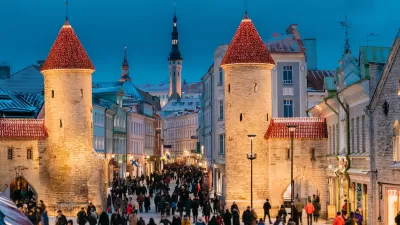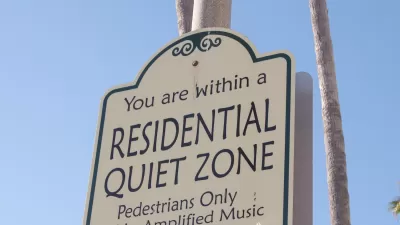The initiative recognizes parks and other areas that preserve natural quiet in a world full of noise pollution.

A nonprofit organization is working to raise awareness about the importance of silence and to preserve places that offer quiet respite from everyday noise pollution. Writing in Reasons to Be Cheerful, Jennifer Cole outlines the mission of Quiet Parks International (QPI), which aims “to save quiet for the benefit of all life is part of a broader effort to combat the increasing noise of our world.”
A growing body of research indicates that excessive noise can have serious harmful health impacts, affecting everything from hearing to high blood pressure. One researcher from the University of British Columbia developed a pilot project dubbed Silent Trails that created two “acoustically protected trails” in the Vancouver parks system. “Her requirements were stringent: no dogs, no bicycles, no nearby construction — and they had to be fully accessible to the public. Once she’d chosen the trails, signs were posted encouraging users to listen closely to sounds such as bird calls and the wind through the trees.”
Through its ‘noise awards’ program that identifies and maps particularly quiet places, QPI hopes to draw awareness to the need for spaces where people can enjoy the subtler sounds of nature. To date, it has identified eight parks that qualify for their more stringent “Wilderness Quiet Park” certification. “While certification as a Wilderness Quiet Park doesn’t automatically shield an area from noise intrusion, the visibility and awareness that it generates does make it harder for landowners and managers to justify actions that could disturb the natural silence.” The organization also recognizes quiet oases within urban centers, such as Philadelphia’s Bartram Garden.
FULL STORY: Preserving Natural Quiet in an Ever-Louder World

Planetizen Federal Action Tracker
A weekly monitor of how Trump’s orders and actions are impacting planners and planning in America.

Congressman Proposes Bill to Rename DC Metro “Trump Train”
The Make Autorail Great Again Act would withhold federal funding to the system until the Washington Metropolitan Area Transit Authority (WMATA), rebrands as the Washington Metropolitan Authority for Greater Access (WMAGA).

The Simple Legislative Tool Transforming Vacant Downtowns
In California, Michigan and Georgia, an easy win is bringing dollars — and delight — back to city centers.

Albuquerque’s Microtransit: A Planner’s Answer to Food Access Gaps
New microtransit vans in Albuquerque aim to close food access gaps by linking low-income areas to grocery stores, cutting travel times by 30 percent and offering planners a scalable model for equity-focused transit.

This City Will Pay You to Meet Your Neighbors
A North Kansas City grant program offers up to $400 for residents to throw neighborhood block parties.

Commentary: Our Silence Will Not Protect Us
Keeping our heads down and our language inoffensive is not the right response to the times we’re in. Solidarity and courage is.
Urban Design for Planners 1: Software Tools
This six-course series explores essential urban design concepts using open source software and equips planners with the tools they need to participate fully in the urban design process.
Planning for Universal Design
Learn the tools for implementing Universal Design in planning regulations.
Smith Gee Studio
City of Charlotte
City of Camden Redevelopment Agency
City of Astoria
Transportation Research & Education Center (TREC) at Portland State University
US High Speed Rail Association
City of Camden Redevelopment Agency
Municipality of Princeton (NJ)





























